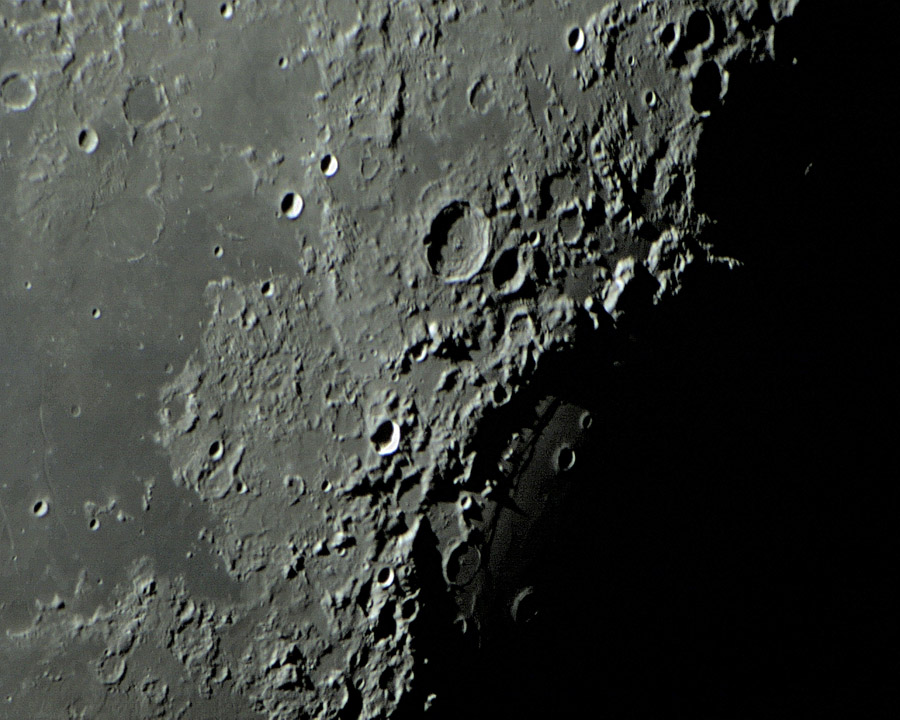Difference between revisions of "June 5, 2010"
| Line 6: | Line 6: | ||
<em>image by [mailto:Tolentino@fumec.br Ricardo Tolentino], Brazil</em><br /> | <em>image by [mailto:Tolentino@fumec.br Ricardo Tolentino], Brazil</em><br /> | ||
<br /> | <br /> | ||
| − | I am always excited about a new perspective on the lunar surface. But I also enjoy the familiar pleasure of seeing old friends such as these around the western shore of Crisium. The wonderful sunset lighting on the basin's main rim highlights the fact that a relatively narrow raised rim does rise above basins, as for craters. And the shadow cast by the [https://the-moon.us/wiki/ | + | I am always excited about a new perspective on the lunar surface. But I also enjoy the familiar pleasure of seeing old friends such as these around the western shore of Crisium. The wonderful sunset lighting on the basin's main rim highlights the fact that a relatively narrow raised rim does rise above basins, as for craters. And the shadow cast by the [https://the-moon.us/wiki/Dorsum_Oppel Oppel Ridge] suggests the 200 m meter downdrop that occurs inside the Ridge. [https://the-moon.us/wiki/Yerkes Yerkes], whose central peak is normally inconspicuous, shows it like a punctuation mark. And O'Neill's Bridge still doesn't exist but is interesting to observe and understand the excitement that O'Neill must have felt when he discovered it. [http://www.lpod.org/?m=20060131 Proclus] looks like it lost a ray, for the southern edge of its downrange ejecta is invisible because it is near the terminator. The northwestern edge is well seen and the thick (for a ray!) deposit of material north of the ray clearly shows up as a change in gray of the surface. Keep prowling this image to discover other small friends.<br /> |
<br /> | <br /> | ||
<em>[mailto:tychocrater@yahoo.com Chuck Wood]</em><br /> | <em>[mailto:tychocrater@yahoo.com Chuck Wood]</em><br /> | ||
| Line 15: | Line 15: | ||
<br /> | <br /> | ||
<strong>Related Links</strong><br /> | <strong>Related Links</strong><br /> | ||
| − | Rükl plate [https://the-moon.us/wiki/R%C3% | + | Rükl plate [https://the-moon.us/wiki/R%C3%BCkl_26 26]<br /> |
Image found on the [http://lpod.org/coppermine/displayimage.php?pos=-4536 LPOD Photo Gallery]<br /> | Image found on the [http://lpod.org/coppermine/displayimage.php?pos=-4536 LPOD Photo Gallery]<br /> | ||
<br /> | <br /> | ||
Latest revision as of 18:50, 13 October 2018
Crisium Cronies

image by Ricardo Tolentino, Brazil
I am always excited about a new perspective on the lunar surface. But I also enjoy the familiar pleasure of seeing old friends such as these around the western shore of Crisium. The wonderful sunset lighting on the basin's main rim highlights the fact that a relatively narrow raised rim does rise above basins, as for craters. And the shadow cast by the Oppel Ridge suggests the 200 m meter downdrop that occurs inside the Ridge. Yerkes, whose central peak is normally inconspicuous, shows it like a punctuation mark. And O'Neill's Bridge still doesn't exist but is interesting to observe and understand the excitement that O'Neill must have felt when he discovered it. Proclus looks like it lost a ray, for the southern edge of its downrange ejecta is invisible because it is near the terminator. The northwestern edge is well seen and the thick (for a ray!) deposit of material north of the ray clearly shows up as a change in gray of the surface. Keep prowling this image to discover other small friends.
Chuck Wood
Technical Details
02/02/2010; 00:04 Local Time. SkyWatcher 12" DOB + SmartAstronomy 2.5 X Barlow + ORION StarShoot Solar System Color Imager II , just one frame.
Vaz Tolentino Balcony Observatory ( Lat: S 19o 55' 40.6" / Long: W 043o 55' 04.2" )
Related Links
Rükl plate 26
Image found on the LPOD Photo Gallery
Yesterday's LPOD: A Plumbing Problem
Tomorrow's LPOD: Breakfast Tales
COMMENTS?
Register, Log in, and join in the comments.



